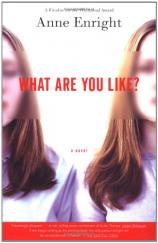Reading Group Guide
Discussion Questions
What Are You Like?

1. What Are You Like? is a book about two estranged sister's struggles to figure out who they are. They both know, intrinsically, that there is a component of their identity missing—something (or someone) that would complete each of them, would answer questions they are both facing. How are Rose and Maria's searches similar? How do they contrast? What does the title 'What Are You Like?' mean to each of the characters in this novel?
2. Czech-born Anton enters Rose's life in 1975 as a transient twelve-year-old foster child in her parents' home. Ten years later, in New York City, he meets Maria, whose 'familiar' face makes him feel at home and in love all over again. But when Maria confronts him about the photo he has in his bag (of a girl that looks just like her at the age of 12), he becomes elusive and short-tempered.Why does her take off in the wake of this confrontation with Maria? (p. 59) How important is his existence-- and relationships with both girls at different times-- to the story as a whole? What do Rose and Maria's different approaches to their relationship with Anton mean about bonds between siblings, and bonds between lovers?
3. What role does mysterious lover Anton play in Maria's evolution (or devolution)? What is it that he 'did' to Maria? (p. 143) Why does Maria look for Anton in stranger's faces after he leaves? (p. 142) What sort of loss does she really suffer with his departure from her life? Likewise, we find Rose looking for her mother in the faces of strangers, actresses, adoption clerks, anyone who makes eye contact. (p. 147) What is the connection between these separate searches?
4. What fueled Rose's need to steal things? (p. 123) Why did she equate the sensation of being caught with something sexual? What is the author implying about Rose when she says, 'she liked the edgy raped feeling, when she lifted her head and looked the judge in the eye.'? (p. 123)The sound that comes into Rose's mind ('plink, pingeddy pong') before she has sex for the first time with William, is the same as the muzak she was becoming addicted to in the stores that she stole from. What is the connection between sex and stealing for Rose? (p. 123)
5. On p. 137, the author inserts unspoken dialogue into the prose. She precedes what the protagonist (Rose) does say with what she doesn't say. For example:
'… She did not say,
'I think I'm losing it.' She said,
'Oh, you know.''
What do you think is the author's intention with this technique?What affect does it have on the pace or mood of the chapter as it is being read? 6. What prevents Maria from going 'home' to her parents' house when she leaves the hospital after her dramatic return from New York City? What, as Evelyn asks, is she waiting for?
7. Author Enright skillfully utilizes her prose to represent the duality of the twins with implied duality of meaning. Often just one sentence, subtly placed and worded, leaves the reader wondering which, of two distinct meanings, she intended. For example:
(p. 74)
'When she looked at him she did not see him at all. She did not, she could not, see the truth. Because the only truth of it was that every day of his life he had fought to make her safe.'
In this instance, we cannot be sure if the 'she' is Berts' daughter Maria, or the blind woman he has just watched fall into an uncovered manhole on the street. He may believe he has fought to keep Maria safe his whole life, from the tragic secret of her existence. Conversely, and more literally, he has worked for the Public Works department his whole adult life to keep the streets safe for pedestrians and civilians. Which interpretation do you think the author intended the reader to see, if either? What other instances of double meaning stand out in the novel?
8. In the chapter entitled 'Blood,' (begins p. 151) Maria and Rose appear in the same chapter for the first time in the novel. This might be considered a structural turning point for the story. What else could this mean for the reader, considering the fact that in this chapter Maria says she wants to die, and, simultaneously, Rose imagines the woman across the way is trying to hang herself, as she exclaims 'No!'?
What is the significance of the passage at the end of the chapter 'Maria can see the sheet of glass between the real blood and the reflected blood. It is very thick. It is very clean and calm. She is trying to open the bottle with her teeth. She looks into her own eyes.
'Hello.' (p. 158)
Are Maria's desire to 'go home' and 'to die' really two different choices? Or are they the same thing for her? (p. 152-3)
9. What is the narrative purpose of the chapter 'Berts in Love'? (p. 171) What does it reveal to the reader about Berts that we previously didn't know? What does the girl from the office Christmas party represent for Berts? Is he really 'in love' with her? What does he love about her? Why does he keep helping her? Advising her? Trying to stop her 'from making mistakes'? (p. 177) What prompts this ordinarily passive man to finally confront his daughter Laura about her alcohol abuse and try to 'save her from the gutter'? (p. 179)
10. Both of the wives in Berts' life seem to feel closest to him when he is asleep:
p. 241 – (Anna) 'It was in that confirmation, rising out of sleep, or falling into it, that I felt most loved by him.'
P. 211 – (Evelyn) 'He started to snore. Evelyn heard it and was astonished. It was for this she married him, for his ability to sleep.'
What does Berts' sleep represent? Is it when he is at his most peaceful, and guilt-free, or something else altogether?
What Are You Like?
- Publication Date: April 8, 2002
- Paperback: 272 pages
- Publisher: Grove Press
- ISBN-10: 0802138896
- ISBN-13: 9780802138897








